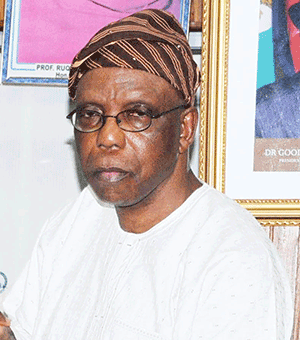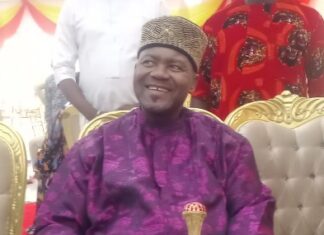An insatiable appetite of a burgeoning middle class for higher education, a status symbol as well as a passport out of poverty in Nigeria, has led to the establishment of more universities by the federal and state governments and by private individuals and institutions. Additional primary and secondary schools have been built, too. But they are a drop in the ocean of a huge population. As the surge in demand for university places rides the crest of corruption in the national fabric, nearly everyone finds it handy to cut corners.
MARY OGEDENGBE looks at the resulting low standard of education that costs a fortune to acquire. This, in a country where, less than three decades ago, admission into high quality federal universities was based on merit; was almost completely free, and was accessible to both rich and poor.
NUC Executive Secretary, Julius Okojie
A total N4.6 trillion was approved by the Senate on April 9 as the federal budget for this year. Of this, N493.45 billion was allocated to education, an increase from the previous year’s figure of N427.51 billion.
But, year in year out, the money for education is insufficient or misappropriated.
Overrated system
Obafemi Awolowo University (OAU), established 1962, and the University of Port Harcourt (UNIPORT), established 1975, are two of Nigeria’s oldest. Lagos State University (LASU), founded 1983, is a recent addition.
But these, alongside many others, were established to fill the widening gap in education by providing cheap, yet quality tuition.
However, this focus has changed as universities are not as affordable as they once were.
In late May, OAU students broke out in protest upon learning of increase in fees. The Vice Chancellor, Professor Bamitale Omole, reminded them at a press conference on June 3 that fees were last raised 10 years ago even as the cost of education worldwide has escalated.
Omole said the school needs more funds to provide a conducive learning environment.
OAU Students Union Government (SUG) President, Isaac Ibikunle, countered that the management “remained recalcitrant” and the students resolved to go back to action. “We are expecting them to call us back for renegotiation, and if they don’t, we will continue.
“ASUU (Academic Staff Union of Universities) and NASU (Non Academic Staff Union of Universities) are not in support of the increase because they know how much management is given,” Ibikunle stated.
In OAU, students of humanities are to pay N61,700 per session, sciences (N72,700) and clinical/pharmacy (N75,700). Acceptance fee for new students costs an extra N20,000. Additional money is required for accommodation and feeding.
Fees at LASU were raised from the base N25,000 to between N193,750 and N345,000 per session. A recent protest by the students made the government to slash the fees by between 34 per cent and 60 per cent on June 12. But the students stood their ground that the original fees should remain.
Some state universities now charge nearly as high as private universities, where fees start from about N500,000 per session. The difference is that fees in private universities include accommodation and feeding, with a guarantee of some ounce of quality education minus interruption through strike by lecturers or protests by students.
A large numbers of students have had to drop out, those who remain in school are struggling.
Senior Staff Association of Nigeria Universities (SSANU) Chairman, LASU branch, Adewale Saheed, said the school has “just a little over 12,000 full time students, and at this rate of decline, by the time the current 300 level and 400 level students graduate, LASU may not have up to 5,000 students.
“As we predicted three years ago, academic and non academic staff of the university will suddenly wake up one day to find out that their services are no more needed. This is about to happen.
“There are reports that there is just a student at 100 level in French department, six in Islamic studies and 25 in the faculty of law. This is a recipe for mass sack.”
Earlier this month, UNIPORT added N9,400 to fees. The students took to the streets on June 10 to protest.
After a meeting between the school authorities and the SUG, the increase was reduced to N5,000. But the students insisted on no hike at all.
A nation falling apart
Benjamin Disraeli wrote: “Upon the education of the people of this country, the fate of this country depends.” However, with fees in government universities going up unpredictably, the premium attached to education is slowly falling apart, and so is the nation.
Ibikunle confirmed that some new students at OAU have resorted to borrowing to make up for fees, others stay at home as their parents cannot pay.
He added: “Lots of students have called me. Some of them have borrowed money, while some can only pay the acceptance fee.
“The management is saying that they are ready to support only four students in the entire school, but the criterion is that they must be brilliant. What kind of criterion is that? We don’t even want it. Let them return to the original school fees.”
Fight for the future
A public affairs analyst and representative of the Joint Action Front (JAF), Achike Chude, said “it is a good thing that the students are waking up. When they fight for school fees, they are fighting for their future.”
In this year’s budget, OAU received N10.823 billion, UNIPORT N10.092 billion. Chude argued that such amounts would have been enough to keep fees down but for stealing and waste by officials.
“That is why excesses should be curtailed and there should be proper accountability. So long as we have corruption in Nigeria, university officials can’t make the argument that there is no money.
“We support the students’ strike. All notable unions should ensure that these people make good use of the money given to these officials,” he stressed.
Free education of yesteryears
Primary education in state schools became free in the South West in 1955 and was made free nationwide in 1976. Tuition in government secondary schools has been mostly free nationally since 1979, beginning in the South West.
Nigeria began to establish more universities in 1960, and tuition was free in federal universities until the 1990s when they started charging token fees for tuition.
The federal government subsidised university education heavily in the past. Up to the end of the 1980s, an undergraduate only paid for accommodation, departmental fee, and feeding. Both accommodation and departmental fees cost less than N200 per session.
By the mid 1980s, feeding in the refectory cost 50 kobo per plate of food, served with the quarter part of a chicken and with fruits – banana or orange, take your pick. You also drank as many cups of beverage (tea, coffee, cocoa) as you wanted.
A student got a rebate on Nigeria Airways flights. With the rebate, for instance, a one-way ticket from Lagos to Enugu cost N49 and a return ticket N98.
JAMB, before and after
Before the University Matriculation Examination (UME) was introduced by the Joint Admission and Matriculation Board (JAMB) in 1978, and for about 12 years after, admission was based on merit. Students with the best results were admitted to any university of their choice, regardless of other factors.
Quality education of yore
Up to the 1980s the quality of education in Nigeria was comparable to that of any country anywhere in the world. Then, a product of a Federal Government College, now called Unity School, was as good as any secondary school graduate in Europe, America or Japan.
Graduates of Nigerian universities ranked among the best globally. They were the toast of foreign universities, and easily got scholarships for higher degrees in the Commonwealth and in Europe and America.
The current fad of Nigerians going to study in Indian and some African universities was unheard of, as most who did risked not having their degrees recognised.
But education in Nigeria began its dumbing down in the early 1990s, partly because of the explosion in the number of students. Demand outstripped supply, despite the establishment of more universities, federal, state, and private.
Corruption, the Nigerian disease, escalated in the university system, reflecting the larger society.
Examination malpractices are common place. Lecturers demand bribe, in cash or kind, to inflate marks for examination written or award marks for examination not written at all. Where teachers do not demand bribe, students voluntarily offer it.
Besides, since the 1990s, corruption has been mingled with incessant strikes by teachers in government universities over sundry matters such as pay, facilities and condition of service.
As a result, a course meant for four years can last six; and one scheduled for five years can take up to eight.
By comparison
Figures on the website of the National Universities Commission (NUC) show that Nigeria currently has a total 129 universities – federal (40), state (39), private (50).
This is still grossly inadequate for a country with a population of 170 million and a huge quest for university education.
Japan has a population of 126 million but has 778 universities – national (86), public (95) and private (597).













